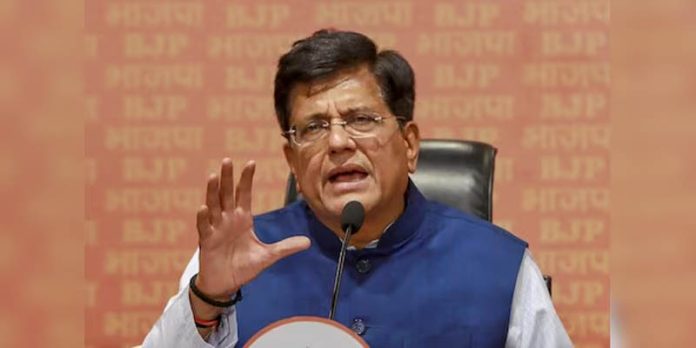NEW DELHI, Sep 24 : A series of measures to improve ease of doing business, zero tolerance for corruption and the focused effort on emerging sectors like electronics have helped promote ‘Make In India’ and boost both domestic and foreign investments in the country, Commerce and Industry Minister Piyush Goyal said on Tuesday.
“We have achieved great success and a brilliant future is ahead for manufacturing in the country as the ‘Make in India’ programme is celebrating its 10 years,” he said.
The ‘Make in India’ initiative was launched on September 25, 2014, to facilitate investment, foster innovation, build world-class infrastructure, and make India a hub for manufacturing, design, and innovation. It is one of the unique ‘Vocal for Local’ initiatives that promoted the country’s manufacturing domain to the world.
“We are seeing very big investment plans on the anvil which will create millions of jobs and expand our manufacturing contribution to the economy,” Goyal told PTI.
Recalling the journey of the initiative, the minister said that the Modi-government started with “very” tough times as the mood of investments both domestically and internationally was “very” low in 2014 and businesses were not sure about the future.
Internationally, the image of the country was down and the country was categorised as a “fragile five” economy, he said adding it took this government some time to earn the trust of investors.
“But that happened very quickly under Prime Minister Narendra Modi because he took very bold decisions whether it is one nation one tax – GST, whether it is IBC (Insolvency and Bankruptcy Code), or putting in place a transparent process for auction of mines,” he said.
The government also gave investors stable and predictable policies, with a commitment not to do retrospective amendments. The minister said.
Due to measures like digitisation and simplifying procedures, India’s rank in the ease of doing business climbed 14 rungs to 63 among 190 countries.
“Zero tolerance for corruption, and the focused effort on emerging sectors for promoting Make in India ignited the investments both domestically and internationally,” Goyal said.
“And 10 years later, we are both redeemed by the results and excited about the future. In many areas, we have seen significant progress like in mobiles, we are now world’s second largest manufacturers with production going on from only two factories to 200 in this field,” he added.
Besides, sectors like steel, and cement where demand was generated because of a significant ramp-up in infrastructure funding, India witnessed massive investments and growth under the Make in India programme.
The government’s initiatives in other segments such as textiles, ceramics, toys, plastics, chemicals, and pharma, have resulted in an increase in domestic capacities which have met the needs of India as well as helped boost the country’s exports which reached an all-time high of USD 778 billion in 2023-24.
“We had an initial year, where the mood of the investing community was low. But our efforts bore fruit in terms of improving the macroeconomic fundamentals of the economy, improving the investment climate, facilitating investors and manufacturers because of which now we are seeing significant uptake,” Goyal said.
Despite the Covid-19 pandemic, and geo-political challenges due to two ongoing wars (Russia-Ukraine and Israel-Hamas) and the Red Sea crisis, India was able to maintain its manufacturing share in the country’s GDP.
The minister expressed confidence that with the increasing momentum seen under the Make in India programme, “we believe that the share of manufacturing will also start increasing in the coming years”.
The steps taken to boost manufacturing and attract investments include easing foreign direct norms in a number of sectors such as space, coal mining, e-commerce, pharma, civil aviation, contract manufacturing, and digital media.
Over the last 10 financial years, FDI inflow has increased by 119 per cent reaching USD 667 billion, compared to USD 304 billion in the previous 10 years (2005-14), with over 90 per cent of total FDI received through the automatic route.
In 2020, the government rolled out the Production Linked Incentive (PLI) Schemes for a number of sectors to provide financial incentives to enhance domestic manufacturing. The scheme has attracted substantial investments in key sectors such as electronics, and pharmaceuticals.
The other measures include national logistics policy, national single window system, Jan Vishwas (Amendment of Provisions) and law to decriminalize 183 provisions in 42 legislations.
On the infrastructure front, the government focused on developing industrial corridors and smart cities, integrating state-of-the-art technology and high-speed communication to create world-class infrastructure.
Innovation and research were supported through streamlined registration systems and improved intellectual property rights (IPR) infrastructure. Efforts were made to identify industry skill requirements and develop the workforce accordingly. (PTI)


